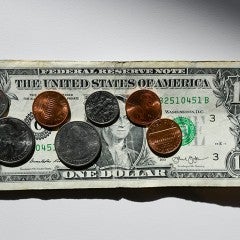This was just one finding explored in “Beyond Dollars and Cents: Exploring Budgeting, Saving, and Financial Security in the Houston Area,” authored by research analysts Joy Njeh, Aaron Niznik and Dan Potter, director of the Kinder Institute’s Houston Population Research Center. United Way of Greater Houston was a research partner for the study, which drew on responses from over 5,500 members of the Greater Houston Community Panel.
About 35% of residents are approaching financial security, with enough savings to cover one or two months of expenses. But 30% of residents are considered financially vulnerable, lacking savings to cover two weeks’ worth of expenses.
Potter said this creates tension between short-term needs and long-term planning for too many individuals, families and households.
“It makes sense that savings would be viewed as a luxury by many in the Houston area when 1 in 3 residents wouldn’t be able to cover their expenses for more than two weeks if they lost their job,” Potter said. “Hundreds of thousands of households are literally living paycheck to paycheck, dependent on the next one to pay the rent or cover the grocery bill for the week. Any disruption spells disaster.”
These concerns are especially acute as a recent report from the Federal Reserve Bank of Dallas notes that residents in Texas are more likely than the U.S. overall to have stress and concern about inflation and to struggle with expenses.
Who is financially secure?
About 1 in 5 Hispanic and Black residents indicated they could cover three months of living expenses using savings, compared to over half of White and Asian residents.
As expected, financial security tended to be associated with income. The majority of Harris County residents earning $100,000 or more reported being financially secure.
For residents earning $75,000-$99,999, 47% were financially secure, while 23% of those earning $35,000-$49,999, and 15% of those earning under $25,000 reported financial security.
“Wages play a crucial role in this equation, and in many cases they are not keeping pace with the rising cost of living, making it difficult for people to save enough,” Njeh said. “Even with careful budgeting, if wages don’t fully cover essential expenses like housing, health care and food, there’s often little left over to set aside for emergency funds or to invest in building wealth.”
At the same time, the researchers found that some financial practices play a bigger role than income alone.
Saving habits and barriers
Whether it is a consistent dollar amount or using whatever funds are remaining after the bills are paid, any kind of saving increases chances of reaching financial security, which pays dividends in the present as well as the future, Potter said.
“People who are financially secure have better health, lower stress and experience a variety of other benefits. In this way, perhaps there’s some cultural reframing needed that situates savings as being about taking care of ourselves today to be better off tomorrow,” Potter said.
The survey found that 31% of Harris County residents save a set amount every month, and 33% save what is remaining at the end of the month. When asked what was preventing people from being able to save as much as they might want to, the most common barriers were the cost of housing, emergency expenses such as home or car repairs, reducing credit card debt and paying for health care or other medical expenses.
While saving is clearly a path to building financial security, the report also notes that half of those who save in some way had not achieved a level that could sustain three months of expenses.
The role of budgeting
About 64% of Harris County residents keep some sort of budget, whether formally in writing or on a mobile app or informally by tracking mentally. While it can be a beneficial practice, the Kinder Institute found that the mere act of budgeting was not enough to reach financial security.
“Budgeting is almost certainly related to other financial outcomes and metrics,” Potter said. “It could be related to paying down debt, minimizing extraneous expenses, having an investment portfolio or setting aside money for savings. If a budget includes an item for savings, then that can help move someone toward financial security.”
The most common reason given for not having a budget was that residents felt like they did not make enough money to justify it, a response from 39% of residents.
“This is of course not true,” said Jessica Davison, senior director of mission and strategy at United Way of Greater Houston. “No matter how much a person earns, they can always have a budget because it will benefit them, even if it doesn’t lead directly to financial security.”
Other reasons given by residents for not budgeting included not knowing how to get started (18%), feeling stressed or overwhelmed with the budgeting process (17%) and having their earnings fluctuate too frequently (16%).
“There are resources available to most any resident in most any neighborhood in the Houston area who is coming up against these barriers to budgeting,” Davison said, pointing to United Way’s website as a resource to find organizations that provide financial coaching and goal setting.
There are numerous community organizations around the Houston area working with individuals, families and households to move them toward greater financial security. United Way and the Kinder Institute plan to continue to partner to more fully understand the needs and challenges.
“The road to financial security is increasingly challenging, but with the right tools, programs and support, Houston’s residents can overcome financial struggles, build lasting stability and create better futures for themselves and their families,” Njeh said.


